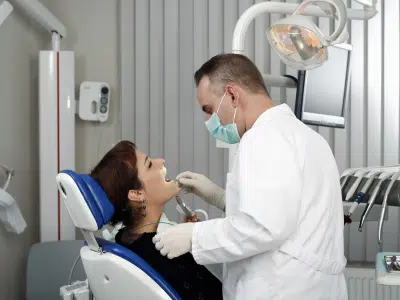Orthodontics and Speech: Can Braces Improve Your Pronunciation?

Orthodontics Speech: Can Braces Improve Your Pronunciation?
Braces do more than straighten teeth. They can also affect how people speak. Some experience temporary Orthodontics Speech changes when they start treatment, while others see long-term improvements in pronunciation. The connection between orthodontics speech goes beyond appearance. It involves tongue placement, airflow, and how teeth work together to form sounds.
How Teeth Affect Speech
Teeth help shape sounds by controlling airflow and tongue placement. When they are misaligned, they can interfere with clear orthodontics speech. Some people struggle with certain sounds because their teeth prevent their tongue from making proper contact. Others may have lisps or difficulty pronouncing words due to gaps or crowding.
Common Speech Issues Related to Teeth Alignment
- Lisps – Often caused by improper tongue placement due to gaps or misaligned front teeth.
- Whistling Sounds – Happens when air escapes through small gaps between teeth.
- Slurred Speech – Can occur when crowded teeth limit tongue movement.
- Difficulty Pronouncing Certain Letters – Sounds like “s,” “th,” and “f” may be affected by teeth positioning.
Braces can help correct these issues by aligning teeth and creating a better environment for speech.
How Braces Affect Speech
Braces shift teeth into better positions. This can improve pronunciation over time. Some people experience slight orthodontics speech changes when they first get braces. The tongue and lips need time to adjust to the new structure in the mouth. Most adapt within a few weeks.
Temporary Speech Changes After Getting Braces
Some common changes during the adjustment period include:
- A slight lisp as the tongue gets used to brackets and wires.
- Difficulty with “s” and “sh” sounds due to increased friction inside the mouth.
- More saliva production, making certain words harder to pronounce.
These issues typically improve as the tongue and lips adjust to the braces. Speech therapy exercises can speed up this process.
Can Braces Permanently Improve Pronunciation?
Braces can lead to long-term improvements in speech for many people. Properly aligned teeth help the tongue move more freely. They also create a balanced bite, allowing better airflow for pronunciation.
How Braces Help Speech Clarity
- Fixing Overbites and Underbites – Misaligned bites can cause mumbling or difficulty articulating sounds. Braces help balance the bite, making speech clearer.
- Closing Gaps – Spaces between teeth can cause air to escape when talking. Aligning teeth eliminates unnecessary airflow, reducing whistling or lisps.
- Correcting Crowding – Overlapping teeth can interfere with tongue movement. Braces create space, allowing smoother speech.
- Adjusting Tongue Posture – The tongue needs proper support from the teeth to form sounds correctly. Aligned teeth help the tongue position itself properly.
Some people may need additional speech therapy after orthodontic treatment. A speech therapist can help retrain the tongue and lips for better pronunciation.
Braces and Different Age Groups
People of all ages can experience speech improvements with braces. Children often see the most significant benefits since their mouths are still developing. Adults can also improve pronunciation, but their speech patterns may take longer to adjust.
Children and Speech Development
Braces play an important role in early speech development. Kids with misaligned teeth often struggle with pronunciation. Orthodontic treatment during childhood can prevent long-term speech issues. Early intervention allows their teeth and jaw to develop in a way that supports clear speech.
Adults and Speech Adjustments
Adults may have ingrained speech habits, making adjustments take longer. However, properly aligned teeth still improve pronunciation over time. Speech therapy can help adults adapt more quickly.
Other Orthodontic speech Treatments That Can Help Speech
Braces are not the only orthodontics speech option for improving pronunciation. Other treatments can also help:
Invisalign and Clear Aligners
Clear aligners straighten teeth without wires or brackets. They can also improve speech by aligning the bite and eliminating gaps. Some people experience mild speech changes while wearing them, but adjustments happen quickly.
Palatal Expanders
These devices widen the upper jaw. They help create more space for the tongue, reducing speech issues related to crowding or narrow palates.
Retainers
Retainers help maintain teeth alignment after braces. Wearing them as prescribed prevents speech problems from returning.
Tips for Adjusting to Orthodontics Speech Changes with Braces
Some people take longer to adjust to braces than others. These tips can help make the transition easier:
- Practice Speaking – Reading out loud or repeating tongue twisters helps train the tongue and lips to work around braces.
- Speak Slowly – Rushing words can make pronunciation harder. Slowing down improves clarity.
- Stay Hydrated – Dry mouth can make speech harder. Drinking water keeps everything moving smoothly.
- Try Speech Exercises – Working with a speech therapist or practicing specific exercises can help with adjustments.
Most people adjust to their braces within a few weeks. Speech may continue improving as the teeth move into their final positions.
Final Thoughts
Braces can improve pronunciation by aligning teeth, correcting bites, and giving the tongue proper support. Some people notice temporary speech changes when they first get braces, but improvements happen over time. Children often see the most significant benefits, but adults can also experience clearer speech with orthodontic treatment. Speech therapy can further enhance results. Braces do more than create a straight smile—they also help people speak with confidence.





